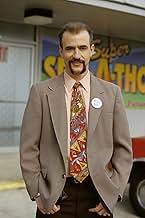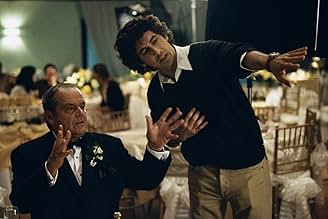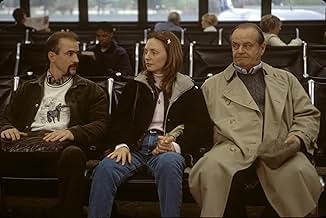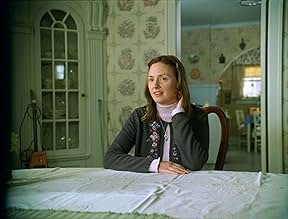एक हाल ही में सेवानिवृत्त आदमी अपने से अलग बेटी की शादी की यात्रा पर निकलता है, जिसमें उसे खुद और जीवन के बारे में अपेक्षा से अधिक पता चलता है.एक हाल ही में सेवानिवृत्त आदमी अपने से अलग बेटी की शादी की यात्रा पर निकलता है, जिसमें उसे खुद और जीवन के बारे में अपेक्षा से अधिक पता चलता है.एक हाल ही में सेवानिवृत्त आदमी अपने से अलग बेटी की शादी की यात्रा पर निकलता है, जिसमें उसे खुद और जीवन के बारे में अपेक्षा से अधिक पता चलता है.
- निर्देशक
- लेखक
- स्टार
- 2 ऑस्कर के लिए नामांकित
- 25 जीत और कुल 71 नामांकन
James M. Connor
- Randall's Best Man
- (as James Micheal Connor)
Marilyn Tipp
- Neighbor Lady
- (काटे गए सीन)
फ़ीचर्ड समीक्षाएं
I spent a day watching "About Schmidt", with Jack Nicholson... and then the evening rambling through reviews, since my wife's perception of the ending differed somewhat from mine....
Conflict can often lead to enlightenment and discovery, but not so in the case of Warren Schmidt. In his case it leads to a life of complacency, denial, delusion, and passive-aggressive behaviors... and eventually, to a meaningless life of servitude devoid of passion or purpose.
Since my wife and I are around the same age as the character, and we ponder the same issues of our lives, the film had more significance to us. I found the work to be a cinema-graphic piece of art laced with symbolism and dark humor (at best). I likened it to previous movies like "Death of a Salesman", "The Apartment", "The Swimmer" (Burt Lancaster), or a short filmed called "The Bridge".
As a cautionary tale (or social comment) on the "American Way" of life, the messages it conveys are slightly exaggerated, but nevertheless there to be debated. We are talking about identity, achievement, interpersonal relationships, and the "average IQ".
In the end, I believe this film will become one that is studied in future classrooms, and it was brave of Nicholson to participate in such a character study and a work intended primarily for writers, actors, and directors. If laughter is "the sound we make when we are surprised (or shocked) by the truth", then the amount of humor you find in this film may be directly related to your own level of naivety or denial. After all, laughter can often be just another defense mechanism, right?
Some movies are straightforward, some are magical, some are mystical, and then, some are symbolic. This movie falls into the last category. The use of time, space, cognitive dissonance, and Irony abound in this work and challenge us to look, think, and feel.
Notes: we would have cut or altered the "Percodan scene" at the rehearsal (as overdone), also note- the cattle at the funeral who later appear on the freeway, inside jokes about Des Moines and Denver, Randall's "Certificate of Attendance", the look on Jeannie's face at the end of Warren's speech at the Wedding Reception, the use of "overstatement", details of wall decorations, and Warren's obvious attraction to the trite, idealistic, delusional, and superficial.
If you are a thinking, feeling, serious movie-lover, you should SEE this film once, and then STUDY it the 2nd time!
Conflict can often lead to enlightenment and discovery, but not so in the case of Warren Schmidt. In his case it leads to a life of complacency, denial, delusion, and passive-aggressive behaviors... and eventually, to a meaningless life of servitude devoid of passion or purpose.
Since my wife and I are around the same age as the character, and we ponder the same issues of our lives, the film had more significance to us. I found the work to be a cinema-graphic piece of art laced with symbolism and dark humor (at best). I likened it to previous movies like "Death of a Salesman", "The Apartment", "The Swimmer" (Burt Lancaster), or a short filmed called "The Bridge".
As a cautionary tale (or social comment) on the "American Way" of life, the messages it conveys are slightly exaggerated, but nevertheless there to be debated. We are talking about identity, achievement, interpersonal relationships, and the "average IQ".
In the end, I believe this film will become one that is studied in future classrooms, and it was brave of Nicholson to participate in such a character study and a work intended primarily for writers, actors, and directors. If laughter is "the sound we make when we are surprised (or shocked) by the truth", then the amount of humor you find in this film may be directly related to your own level of naivety or denial. After all, laughter can often be just another defense mechanism, right?
Some movies are straightforward, some are magical, some are mystical, and then, some are symbolic. This movie falls into the last category. The use of time, space, cognitive dissonance, and Irony abound in this work and challenge us to look, think, and feel.
Notes: we would have cut or altered the "Percodan scene" at the rehearsal (as overdone), also note- the cattle at the funeral who later appear on the freeway, inside jokes about Des Moines and Denver, Randall's "Certificate of Attendance", the look on Jeannie's face at the end of Warren's speech at the Wedding Reception, the use of "overstatement", details of wall decorations, and Warren's obvious attraction to the trite, idealistic, delusional, and superficial.
If you are a thinking, feeling, serious movie-lover, you should SEE this film once, and then STUDY it the 2nd time!
It is hard to recommend About Schmidt to anyone, without actually knowing that person. Not only does the story seem unconventionally uneventful to most of modern audiences, but it also moves with an unhurried patience that will let many viewers shift in their seats. It really depends on whether one can develop an interest to the film and its subject matter, which shows a retired man suddenly facing the void and meaninglessness of his existence.
About Schmidt moves slowly, but it moves with grace. The film's success is deeply in debt to Jack Nicholson, subordinating his personality to the character of Warren Schmidt. It must have been difficult for somebody like Nicholson to display the role's required lack of passion without letting Schmidt lose his human touch. Yet, his portrayal is excellent in its understatement, and his numerable supporting actors do not disappoint either. Fans of Nicholson will be assured in their belief, that their favourite is not only one of the best, but also one of the most versatile actors still working today.
Apart from the acting, director Alexander Payne's film is also well crafted. The somewhat saddened mood is only enhanced by documentary-like shots, constantly making us aware that what we witness is really an everyday-tragedy. The script shows intelligence, and although it contains many subtleties, most of them will not go unnoticed with attentive viewers. Even though About Schmidt is billed as a comedy, it really is a drama. Many of the humorous situations are more tragic than funny, and truly hilarious moments are rare occurrences.
I've often wondered whether the title of About Schmidt has been chosen with any clear intent. The German surname Schmidt equals Smith in English and is one of the most common. So about Schmidt could actually mean "About Everybody". Everybody can wake up one day and discover that everything he or she has devoted himself to, amounts to nothing. It's a frequent social phenomenon, that people suddenly wise up that their lives are almost over, without ever having fully lived them. Maybe that's how all the sea cruises and world tours of old pensioners can be accounted for. Like Schmidt, they are all making a desperate effort to catch up on a time that's long done and over with.
The film does not exactly give answers and, like in reality, does not end with any true revelations to escape all bleakness. But there is something it often likes to apply, namely the self explanatory power of irony. Like one time during the film, when Warren Schmidt decides to adopt a six-year old African foster child by mail. A cheque of twenty-two dollars, which he dutifully provides on a monthly basis, assures that little Ndugu can go to school, gets sheltered, fed and clothed. Yet, in one of his letters Warren writes to him: "What difference has my life made to anyone? None that I can think of. None...at all!"
Well, think again, Mr. Schmidt.
About Schmidt moves slowly, but it moves with grace. The film's success is deeply in debt to Jack Nicholson, subordinating his personality to the character of Warren Schmidt. It must have been difficult for somebody like Nicholson to display the role's required lack of passion without letting Schmidt lose his human touch. Yet, his portrayal is excellent in its understatement, and his numerable supporting actors do not disappoint either. Fans of Nicholson will be assured in their belief, that their favourite is not only one of the best, but also one of the most versatile actors still working today.
Apart from the acting, director Alexander Payne's film is also well crafted. The somewhat saddened mood is only enhanced by documentary-like shots, constantly making us aware that what we witness is really an everyday-tragedy. The script shows intelligence, and although it contains many subtleties, most of them will not go unnoticed with attentive viewers. Even though About Schmidt is billed as a comedy, it really is a drama. Many of the humorous situations are more tragic than funny, and truly hilarious moments are rare occurrences.
I've often wondered whether the title of About Schmidt has been chosen with any clear intent. The German surname Schmidt equals Smith in English and is one of the most common. So about Schmidt could actually mean "About Everybody". Everybody can wake up one day and discover that everything he or she has devoted himself to, amounts to nothing. It's a frequent social phenomenon, that people suddenly wise up that their lives are almost over, without ever having fully lived them. Maybe that's how all the sea cruises and world tours of old pensioners can be accounted for. Like Schmidt, they are all making a desperate effort to catch up on a time that's long done and over with.
The film does not exactly give answers and, like in reality, does not end with any true revelations to escape all bleakness. But there is something it often likes to apply, namely the self explanatory power of irony. Like one time during the film, when Warren Schmidt decides to adopt a six-year old African foster child by mail. A cheque of twenty-two dollars, which he dutifully provides on a monthly basis, assures that little Ndugu can go to school, gets sheltered, fed and clothed. Yet, in one of his letters Warren writes to him: "What difference has my life made to anyone? None that I can think of. None...at all!"
Well, think again, Mr. Schmidt.
I was dubious when my 65 year old father picked this DVD up from the shelf at Blockbuster. "Great choice dad!", secretly wondering why I let him pick 2 films out of the 3 in the special offer they had going. You see, my father has a penchant for Woody Allen and anybody who has a rather dry sense of humour, this includes Nicholson.
We sat down tonight, and the first thing that hit me was the way that the film was shot. It is shot using rather blue and green hues, so the film is rather subdued. Secondly, the music stands out. Instead of using a typical 'boohoo' orchestra, the film uses beautiful wandering piano and marimba sounds.
The characters, I could easily relate to. Helen, the faithful wife who is excited about getting to spend a new chapter of her life with her husband. The husband, who obeys his wife but secretly resents it. A sudden change which causes a rethink in everything he has done up until that point.
At first, this appeared to be a comedy, but it was soon revealed to be a beautifully poignant film. Throughout, it questions mortality, what you can achieve in life, and how to cope with loss, or change. I don't think I have ever cried as much in 2 hours as I did during this film, and yet at the same time laughed so hard that my sides were splitting.
I would thoroughly recommend anybody to watch this film. It will stay with you for a long time.
We sat down tonight, and the first thing that hit me was the way that the film was shot. It is shot using rather blue and green hues, so the film is rather subdued. Secondly, the music stands out. Instead of using a typical 'boohoo' orchestra, the film uses beautiful wandering piano and marimba sounds.
The characters, I could easily relate to. Helen, the faithful wife who is excited about getting to spend a new chapter of her life with her husband. The husband, who obeys his wife but secretly resents it. A sudden change which causes a rethink in everything he has done up until that point.
At first, this appeared to be a comedy, but it was soon revealed to be a beautifully poignant film. Throughout, it questions mortality, what you can achieve in life, and how to cope with loss, or change. I don't think I have ever cried as much in 2 hours as I did during this film, and yet at the same time laughed so hard that my sides were splitting.
I would thoroughly recommend anybody to watch this film. It will stay with you for a long time.
This is an inspiring story. It teaches me so much about what is important in life. Jack Nicholson, with a great performance as Warren R. Schmidt is an example of an American middle class after retiring. For many years he has worked as an actuary at a big insurance company. After retiring, Jack at home, while watching television, he decides to sponsor a six years old boy (Ndugu) from Tanzania. Sending a check of US$ 22,00 every month, he is also required to write a letter to the boy. In the process of writing these letters, he vents out to the boy about his life frustrations, his lost dreams and the dilemma he is in. He is married for forty-two years with his wife Helen (June Squibb) and he has a daughter living in Denver, Jeannie Schmidt (Hope Davis) who will marry a looser pretty soon. He misses his daughter. A few days after his retirement, his wife dies, and Jack realizes how important the wife was in his life now even though he never appreciated her. The director of the movie, Alexander Payne takes the audiences with Jack on a trip in a trailer to visit specific places in America. He mainly makes Jack visit the places where he has been before physically but at the same time Jack was revisiting his own life inside. In this trip he realizes what really matters in life - friendship, family and sharing- then why it is important to appreciate them whenever you have a chance.
In 'Citizen Kane' (1941), the director Orson Welles portrays the same idea when creating Mr. Kane. The movie is more than the story of a tycoon's rise and fall; it is an account of what is ultimately important in a person's life. Even though Kane attains riches and prestige, he is far from happy. He ends with two failed marriages and few friends. At his dying bed, all he has left is his reminiscences - and something called "Rosebud." In 'About Schmidt' the director Alexander Payne uses voiceover to convey Jack's thoughts and memories throughout the movie. To be specific it is when Jack is writing a letter to the boy he sponsors - (Ndugu), at the same time Payne is informing the audience about Jack's regrets and pain concerning his wife and daughter while the movie is still rolling on. I think this is a great technique.I believe this has been a great adventure and wake up call to many Americans as to what is important in life and why we should cherish every moment of it.
In 'Citizen Kane' (1941), the director Orson Welles portrays the same idea when creating Mr. Kane. The movie is more than the story of a tycoon's rise and fall; it is an account of what is ultimately important in a person's life. Even though Kane attains riches and prestige, he is far from happy. He ends with two failed marriages and few friends. At his dying bed, all he has left is his reminiscences - and something called "Rosebud." In 'About Schmidt' the director Alexander Payne uses voiceover to convey Jack's thoughts and memories throughout the movie. To be specific it is when Jack is writing a letter to the boy he sponsors - (Ndugu), at the same time Payne is informing the audience about Jack's regrets and pain concerning his wife and daughter while the movie is still rolling on. I think this is a great technique.I believe this has been a great adventure and wake up call to many Americans as to what is important in life and why we should cherish every moment of it.
Jack Nicholson is part of these unique actors who are not afraid of playing demeaning parts.While most of his peers in their sixties/seventies are still playing heroes ,see what he does.He has almost never played the brilliant-lawyer-with-good-prospects.Two examples :"one flew over the cuckoo's nest" and the overlooked "Ironweed" which almost nobody knows and which paired him with an equally extraordinary Meryl Streep.
"About Schmidt" is a very good film,cause it succeeds in blending comedy and drama.And this drama involves US ,cause like Schmidt we are all potentially retired people .We are afraid of losing our job for good (the scene when Nicholson returns to his office is revealing),we are afraid to live with a partner getting old (who's THAT old woman living in my house?) ,we try to enlighten our children for fear they might go astray (and the daughter's family-in-law has nothing to recommend them)... and most of all,we are afraid of this: when you reach 65,you take stock of your life and you realize it's an unfulfilled one.Then you live in the past conditional.
That's why the little African boy is so important;although we never see him ,he's a character in the story: a confident ,and finally,when Nicholson begins to cry,the one thing he can be proud of.The letters he writes to his foster child provides the movie with an unusually inventive use of the voice over.
There are numerous memorable scenes:my favorite is Nicholson's speech during the wedding meal:his attitude is in direct contrast to the praises he says to everyone ,particularly to his daughter's mother-in-law ( Kathy Bates is sensational).
Recommended.
"About Schmidt" is a very good film,cause it succeeds in blending comedy and drama.And this drama involves US ,cause like Schmidt we are all potentially retired people .We are afraid of losing our job for good (the scene when Nicholson returns to his office is revealing),we are afraid to live with a partner getting old (who's THAT old woman living in my house?) ,we try to enlighten our children for fear they might go astray (and the daughter's family-in-law has nothing to recommend them)... and most of all,we are afraid of this: when you reach 65,you take stock of your life and you realize it's an unfulfilled one.Then you live in the past conditional.
That's why the little African boy is so important;although we never see him ,he's a character in the story: a confident ,and finally,when Nicholson begins to cry,the one thing he can be proud of.The letters he writes to his foster child provides the movie with an unusually inventive use of the voice over.
There are numerous memorable scenes:my favorite is Nicholson's speech during the wedding meal:his attitude is in direct contrast to the praises he says to everyone ,particularly to his daughter's mother-in-law ( Kathy Bates is sensational).
Recommended.
क्या आपको पता है
- ट्रिवियाWhen Jack Nicholson received the Golden Globe for Best Actor in a Drama, he commented afterward, "I'm a little surprised. I thought we had made a comedy."
- गूफ़At the wedding, the priest/minister wears the wrong color of vestments: a purple chasuble and blue stole - purple is for Lent and blue is for Advent. The appropriate color for a wedding in terms of church vestments (be it Catholic, Episcopalian or other) is white.
- भाव
Warren Schmidt: Relatively soon, I will die. Maybe in 20 years, maybe tomorrow, it doesn't matter. Once I am dead and everyone who knew me dies too, it will be as though I never existed. What difference has my life made to anyone. None that I can think of. None at all.
- क्रेज़ी क्रेडिटThe film title appears above the New Line Cinema Release credit as end credits are done.
- कनेक्शनEdited into Nudes in the News: Show #102 (2005)
- साउंडट्रैकYou Sexy Thing
Written by Errol Brown and Tony Wilson
Performed by Hot Chocolate
Courtesy of EMI Records Ltd.
Under license from EMI-Capitol Music Special Markets
टॉप पसंद
रेटिंग देने के लिए साइन-इन करें और वैयक्तिकृत सुझावों के लिए वॉचलिस्ट करें
- How long is About Schmidt?Alexa द्वारा संचालित
विवरण
- रिलीज़ की तारीख़
- कंट्री ऑफ़ ओरिजिन
- भाषा
- इस रूप में भी जाना जाता है
- Las confesiones del Sr. Schmidt
- फ़िल्माने की जगहें
- Messiah Lutheran Church, 5015 S. 80th Street, ओमाहा, नेब्रास्का, संयुक्त राज्य अमेरिका(Church where the wedding takes place)
- उत्पादन कंपनियां
- IMDbPro पर और कंपनी क्रेडिट देखें
बॉक्स ऑफ़िस
- बजट
- $3,00,00,000(अनुमानित)
- US और कनाडा में सकल
- $6,50,16,287
- US और कनाडा में पहले सप्ताह में कुल कमाई
- $2,82,367
- 15 दिस॰ 2002
- दुनिया भर में सकल
- $10,58,34,556
- चलने की अवधि2 घंटे 5 मिनट
- रंग
- ध्वनि मिश्रण
- पक्ष अनुपात
- 1.85 : 1
इस पेज में योगदान दें
किसी बदलाव का सुझाव दें या अनुपलब्ध कॉन्टेंट जोड़ें

































